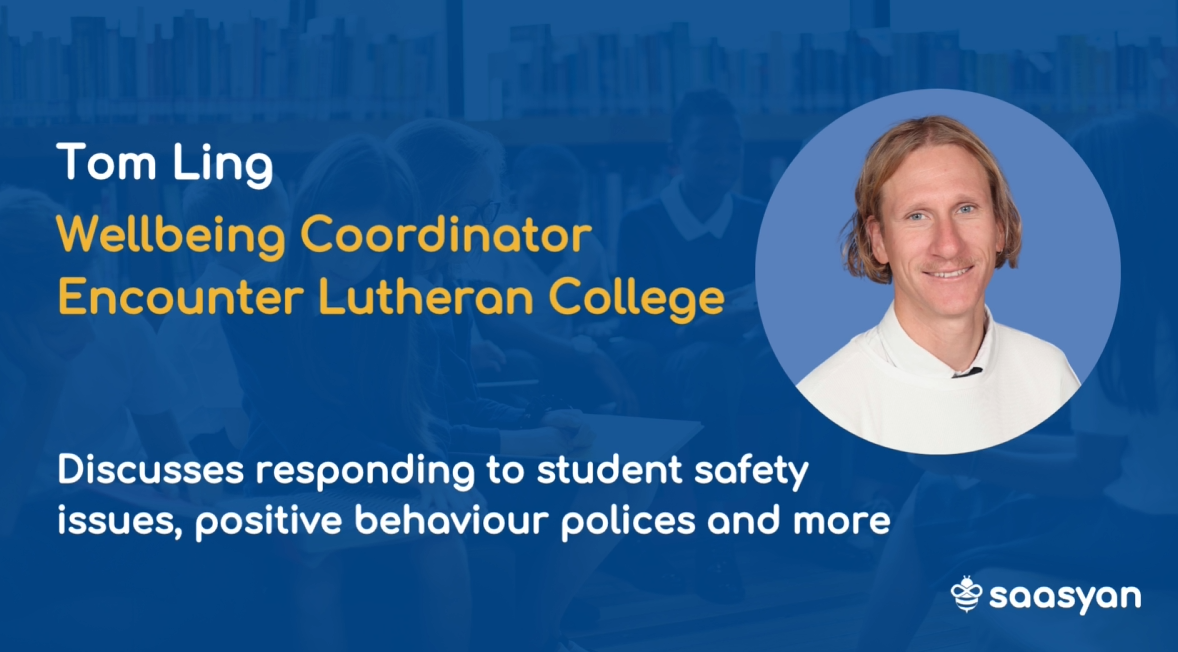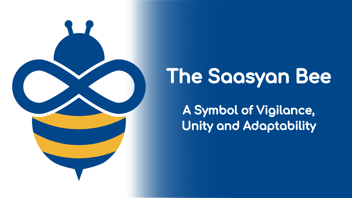Responding to Online Safety Issues, Promoting Positive Behaviour and More With Tom Ling, Encounter Lutheran College

As the wellbeing coordinator at Encounter Lutheran College, Thomas Ling works closely with K-12 students each day to promote positive behaviour and mental health practices.
In this episode of Saasyan's Wellbeing Wednesday Series, he shares some of his insights into student safety responses, the importance of getting parents involved in safe laptop usage, plus some inspiring advice for students today.
What is the biggest challenge students face today when it comes to mental health?
This is a really big question and it was kind of hard to respond to succinctly because there's so many different challenges.
I guess for us, we use the wellbeing engagement surveys each year to give us some data and also just the anecdotal data that we see working with students day to day.
I think some of the common challenges we're seeing are loneliness, worries, anxiety, the ability to cope with stress, especially in the middle school and senior school as students begin to take on more and more.
Their capacity to demonstrate emotional regulation and take on additional stress, resilience as well.
I guess for us, this is interesting because it does mimic the Mission Australia National Youth Survey.
And I mean that identified like 33.9% of young people identified mental health as one of the most important issues for them, and so we're definitely seeing that mirrored at our college.
How do you balance allowing students to have the independence they crave with the need to intervene to ensure digital and physical safety?
When we were setting up how we use the technology, we were really intentional and mindful of not being viewed as the internet thought police, and being able to respect student privacy was a real focus for us.
Like we were talking about earlier, we spent time working as a team to curate specifically the terminology that trigger our alert system.
So we were really looking at the types of language that we one, wanted to respond to and two, had the capacity to respond to, not wanting to set up our team for failure.
For us, we primarily focus on mental health and student safety. If there's ever any times that we think a student might be unsafe, then we have the capacity to respond.
Same goes with bullying as well. That's obviously something that we will respond to.
Then at the same time, you know, if there's private conversations that are happening that wouldn't fit into the realm of bullying, or concerns for student mental health, even if they may not necessarily be the most appropriate conversations to be happening on campus.
We tend not to respond to all of those. One, we don't have the capacity to and culturally as wellbeing team there to support students, we don't want to be perceived as the internet police.
Building those relationships are really important with young people, and so when we're responding, you know, sometimes there may be a need for a punitive response to something that might have happened that needs to be addressed.
But we also don't want to undermine the relationship that we have with the students by being too forward with when we choose to respond, and so we're always trying to juggle being able to build those relationships with the students, help support them to make positive decision making.
And for us, that's when it comes back to, OK, is this something that is putting a student at harm or a student at risk?
That's when we'll generally tend to step in. Or maybe that might be when we might have a conversation as a team and say, “hey, this has popped up. Do you think we have a duty of care or do you think we need to respond to this?” “Do you think somebody's safety or mental health is potentially at harm?” And then if the answer is yes, then we generally try and step in.
What are some policies you have put in place to keep your students safe online?
The positive behaviour policy is one that underpins the behaviour standards and the expectations of what we want students to strive for at school.
We've got an ICT policy as well, which guides the use of technology and all students who receive a laptop they need to sign an agreement with their parents, indicating that they agree with the standards of the technology use and that, just to be clear with the young people and the families, what our expectations are with the use of the devices at school and even outside of school to ensure there's clarity around that.
We deliver our laptops to our year sevens and then we're one-to-one laptop use all through the high school.
And one of the practices that we have which sits within our ICT policy is, all year sevens go through an L to P's program, similar to when you get your license.
So they're actually not allowed to take their laptops home for the first term and they've got a checklist of, say, skills that they need to be able to demonstrate with the use of their laptop, and they can't take it home until they've ticked off all of their little achievements that they need.
And then that program is culminated with a compulsory parent evening to try and support our parents with strategies of what we think appropriate use of technology is at home.
And so the parents have to come in and sit with a young person and they go through the L to P's document.
They go through our recommendations, we chat to them and engage with them.
We let them ask questions so that we can have open dialogue with families as well before they can be signed off to take those devices home.
And like I mentioned earlier as well, another big change this year has been the phone policy where we've banned the use of phones during the school day.
And this has been really helpful for online communication and it falls in that bullying space as well, but also with distraction and student focus.
What's the one piece of advice you'd give to students around the world?
I haven’t watched too much of it, but I’ve got a friend at work who’s a huge Ted Lasso fan, and so I’ve got a reference from that, and it would just be to be curious and not judgemental.
See new places, learn new things, have a project, make yourself uncomfortable and see what you can learn from that.
Be curious about things that you don’t understand. And I think fill your life and fill your mind, with things that fill your bucket and don’t deplete it. I think that would be my main piece of advice.






